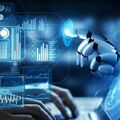AI Agents and the Future of Smart Decision Automation
Artificial Intelligence (AI) is revolutionizing the way businesses and industries operate, and one of its most impactful applications is smart decision automation. AI agents—autonomous software programs capable of analyzing data, learning from patterns, and making decisions—are transforming decision-making processes across sectors, from finance and healthcare to manufacturing and customer service.

As AI continues to evolve, businesses are increasingly relying on AI-driven decision automation to improve efficiency, minimize human error, and enhance strategic planning. In this article, we will explore how AI agents are shaping the future of smart decision automation, their benefits, challenges, and what lies ahead.
Keresőoptimalizálás prémium linképítéssel – Hogyan növelheti weboldalad forgalmát?Keresőoptimalizálás prémium linképítéssel stratégiák – Hatékony technikák
1. Understanding AI Agents and Smart Decision Automation
1.1 What Are AI Agents?
AI agents are intelligent software programs designed to analyze data, make decisions, and take action based on predefined objectives and real-time insights. These agents leverage machine learning (ML), natural language processing (NLP), and predictive analytics to automate complex decision-making tasks.
AI agents can be categorized into:
-
Reactive AI Agents – Respond to specific inputs without learning from past experiences.
-
Learning AI Agents – Continuously improve decision-making through machine learning.
-
Autonomous AI Agents – Operate with minimal human intervention, making real-time decisions.
1.2 What Is Smart Decision Automation?
Smart decision automation refers to the use of AI-powered systems to streamline, optimize, and automate decision-making processes. These systems:
-
Analyze vast amounts of data in real time.
-
Predict outcomes based on historical trends.
-
Make data-driven decisions with minimal human input.
-
Adapt and refine decision-making strategies over time.
Industries are rapidly adopting smart decision automation to enhance efficiency, accuracy, and scalability while reducing operational costs and risks.
2. How AI Agents Are Transforming Decision-Making
AI-powered decision automation is reshaping businesses by introducing speed, accuracy, and intelligence into their workflows. Here’s how AI agents are revolutionizing decision-making across different industries:
2.1 AI in Business and Financial Decision-Making
AI-driven financial and business decision automation is optimizing:
-
Risk assessment in lending and investment strategies.
-
Fraud detection by analyzing transaction patterns.
-
Automated trading in stock markets using AI-driven algorithms.
-
Financial forecasting to predict market trends.
For example, hedge funds use AI agents to analyze market conditions in real time and execute trades based on predictive models, reducing human bias and increasing profitability.
2.2 AI in Healthcare and Medical Diagnosis
In healthcare, AI-powered decision automation is revolutionizing medical diagnostics, treatment planning, and patient care. AI agents assist in:
-
Analyzing medical imaging to detect diseases like cancer.
-
Recommending personalized treatments based on genetic data.
-
Optimizing hospital resource allocation by predicting patient admissions.
AI-powered diagnostic tools, such as IBM Watson Health, have demonstrated superior accuracy in detecting diseases and suggesting optimal treatments.
2.3 AI in Manufacturing and Supply Chain Optimization
Manufacturers are leveraging AI agents to enhance operational efficiency and supply chain management. AI automates:
-
Predictive maintenance, reducing downtime in production.
-
Inventory management, ensuring optimal stock levels.
-
Supplier selection and logistics, improving cost-efficiency.
For instance, AI-powered robots in automotive manufacturing streamline production by making real-time adjustments based on sensor data.
2.4 AI in Customer Service and Personalization
AI-driven decision automation is enhancing customer interactions and personalization strategies. AI agents:
-
Provide real-time customer support via chatbots and virtual assistants.
-
Analyze customer preferences to offer personalized recommendations.
-
Optimize marketing strategies based on customer behavior.
For example, AI-powered recommendation engines, such as those used by Netflix and Amazon, enhance user experience by offering personalized content and product suggestions.
3. Key Benefits of AI-Driven Decision Automation
The adoption of AI agents for decision automation offers numerous advantages:
3.1 Enhanced Speed and Efficiency
AI processes information at a speed far beyond human capability. It can analyze massive datasets, detect patterns, and make decisions in real-time, significantly improving operational efficiency.
3.2 Improved Accuracy and Reduced Human Error
Unlike human decision-makers, AI is immune to fatigue, cognitive bias, and emotional influence. AI-powered decision automation reduces:
-
Errors in financial transactions.
-
Inconsistencies in medical diagnostics.
-
Operational inefficiencies in supply chain management.
3.3 Cost Reduction and Resource Optimization
By automating decision-making, businesses can reduce reliance on manual processes, cut labor costs, and optimize resource allocation, leading to higher profitability.
3.4 Scalability and Adaptability
AI agents continuously learn and adapt to new data, making them ideal for businesses seeking scalable and flexible decision-making solutions.
3.5 Data-Driven Insights for Better Strategy Development
AI doesn’t just make decisions—it provides deep insights into business operations, enabling leaders to:
-
Identify emerging trends.
-
Optimize business strategies.
-
Enhance long-term planning.
4. Challenges and Ethical Considerations
Despite its benefits, AI-driven decision automation presents challenges and ethical concerns:
4.1 Bias in AI Decision-Making
AI models can inherit biases from their training data, leading to unfair or discriminatory outcomes. Addressing AI bias requires:
-
Ethical AI frameworks.
-
Continuous model evaluation and fairness audits.
4.2 Lack of Human Oversight
Over-reliance on AI for critical decisions, such as medical diagnostics or financial approvals, raises concerns about accountability. Businesses must implement human-in-the-loop (HITL) models for oversight.
4.3 Security and Privacy Risks
AI agents process vast amounts of sensitive data, making them vulnerable to cyber threats. Companies must enforce robust cybersecurity measures to protect user information.
4.4 Resistance to AI Adoption
Employees may resist AI implementation due to job displacement fears. Organizations should focus on AI-human collaboration rather than replacement, offering training programs to upskill workers.
5. The Future of AI Agents in Decision Automation
AI decision automation is set to become even more sophisticated. Key trends shaping its future include:
5.1 Explainable AI (XAI)
Future AI models will prioritize transparency and interpretability, allowing users to understand how AI decisions are made.
5.2 AI and Human Collaboration
Instead of replacing humans, AI will function as a decision-support tool, enhancing human expertise in fields like medicine, law, and finance.
5.3 Autonomous AI Decision-Making
Advancements in AI will lead to fully autonomous AI decision-makers in industries such as self-driving vehicles, smart cities, and automated financial trading.
5.4 AI in Ethical and Regulatory Compliance
Governments will enforce stricter AI regulations, requiring businesses to ensure their AI systems are fair, transparent, and secure.
Conclusion
AI agents are fundamentally reshaping decision-making across industries, enabling businesses to make faster, more accurate, and data-driven choices. From finance and healthcare to manufacturing and customer service, AI-powered decision automation is improving efficiency, reducing costs, and enhancing strategic planning.
However, as AI continues to evolve, businesses must address ethical concerns, ensure transparency, and prioritize human-AI collaboration. The future of decision automation lies in a balance between AI efficiency and human oversight, leading to a smarter, more innovative world.
By embracing AI-driven decision-making, organizations can stay ahead of the competition and unlock new opportunities for growth in the era of intelligent automation.
A bejegyzés trackback címe:
Kommentek:
A hozzászólások a vonatkozó jogszabályok értelmében felhasználói tartalomnak minősülnek, értük a szolgáltatás technikai üzemeltetője semmilyen felelősséget nem vállal, azokat nem ellenőrzi. Kifogás esetén forduljon a blog szerkesztőjéhez. Részletek a Felhasználási feltételekben és az adatvédelmi tájékoztatóban.




